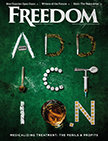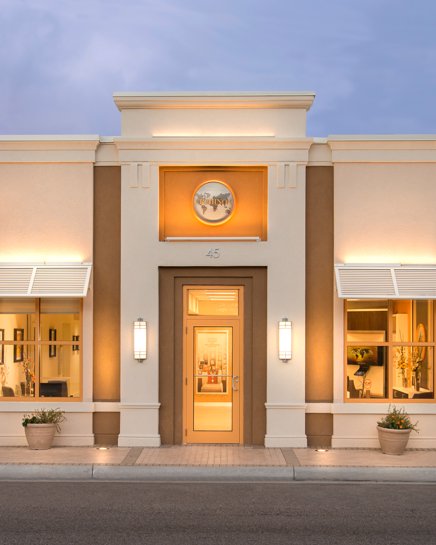
The Criminon program has given me the opportunity to effectively help others become what they’ve always wanted to be—a responsible, trustworthy, dependable part of their family, home and community. I now have an unquenchable desire to help all prisoners be a success and to stay out of prison once they get out.”
Considering the national crisis of overflowing prisons and jails, this could be an enthusiastic correctional officer, having found a solution to the revolving-door recidivism of our criminal justice system. But it is not. The speaker is on the other side of the equation—a convicted felon currently mid-sentence at Florida’s Zephyrhills Correctional Institute.
A Criminon graduate, “John,” described what led him to the program. Struggling with the crushing effect of facing “the magnitude of the harm and injury [he] had inflicted on countless innocent people,” and promising to himself that he would change, he was also struck with another realization: “I didn’t know how to change.”
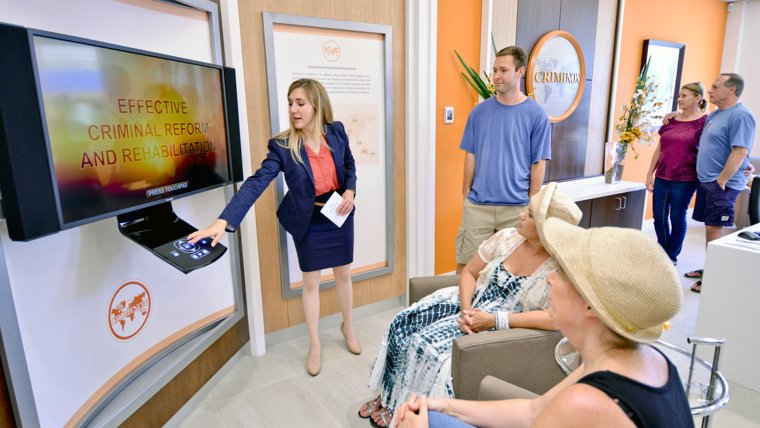
The Criminon program provided answers: “Like the title of the first course, ‘The Way to Happiness,’ the entire Criminon program is an excellent guide to change, to think about the effects of the poor choices we’ve made and to gain new ideas and new concepts, and then start getting experience using those new ideas,” wrote John in a letter to his program supervisor.
Based on the works of L. Ron Hubbard and supported by the Church of Scientology, Criminon is not a faith-based program. It is open to inmates of all faiths, or those without any belief or affiliation. In some correctional institutions it is run as an on-site program; in others, inmates complete courses by correspondence, with lessons graded and responses sent by volunteer supervisors.
Criminon, headquartered in California, is active in more than 2,000 prisons and correctional facilities in 38 nations, with nearly 13,000 inmates enrolled in the program.
At any time, there are about 1,500 Florida inmates involved with the program. Since Criminon first opened its doors in Clearwater, 20,000 inmates have been guided through courses designed to help them take a new look at life and make a new start. Sixty-five trained volunteers currently supervise Criminon Florida’s inmate students through correspondence courses. And with the opening of new headquarters on Fort Harrison Avenue in downtown Clearwater, that capacity has increased significantly.
Having worked for years in the public safety field, Brian Fowler, president of Criminon’s Florida chapter, explained, “Our contribution to the community is this: Anyone who has been through the Criminon program has a far better chance of reintegrating into the community and being a productive citizen.”
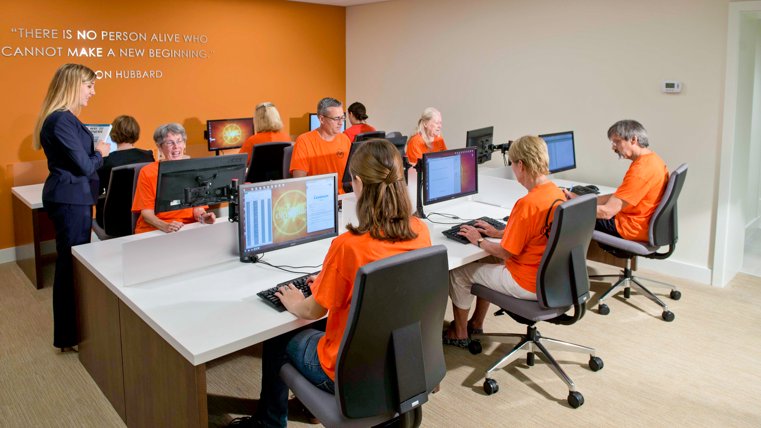
For those who lead an honest life, the problems of the criminal justice system can seem far removed. The folly of such thinking is not just that honest people make up a fair share of victims. The statistics of crime in the United States, and Florida, are astronomical … and affect everyone.
The cost of maintaining the U.S. prison system topped $63.4 billion in 2012, up from $12 billion in 1987. An oft-cited 2012 report published by the Vera Institute of Justice found that in Florida alone, the annual cost—for an average daily population of 101,324 inmates—was $2.08 billion. Or, in orders of magnitude more easily understood, it costs Florida taxpayers more than $20,000 every year to keep each single individual incarcerated.
Of note: Florida has the highest per-capita prison population of any state.
And perhaps the most frustrating statistic: nearly one in three released will be behind bars again within three years.
But if recidivism is one of the justice system’s most serious challenges, that is where the Criminon program excels.
Meet Tom Younk, a Criminon program graduate released in 2013 after completing a five-year sentence, first at the Everglades Correctional Institution, then Sago Palms Re-Entry Center.
Younk began his first Criminon correspondence course in 2010 while at Everglades. By the end of 2011 he had completed the full curriculum of courses available by mail—addressing a variety of subjects aimed at increasing skills to succeed in life after release, but also addressing issues of personal integrity and self-respect. He then moved to Sago Palms, where he began teaching the course to others, running three classes with about 20 inmates in each.
“It’s great, especially because it helps guys analyze their own thoughts and look at who they’re surrounding themselves with,” says Younk. “I saw their thought process change. I saw them thinking about what they’re going to do for their future, making positive plans instead of making plans to go off and do things that land them in prison again.”
After his release, Younk co-founded a not-for-profit organization called “Cons Helping Cons—Free to Serve, Inc.,” which helps released inmates find work and adjust to their new life.
“When prisoners are released, [we] pick them up at the prison door,” said Younk, “we find them transitional housing that they can go to that night, and then we offer them a job.”
Larry Daniels is another Criminon graduate now working with Cons Helping Cons. Daniels entered prison at age 29, facing a mandatory 25 years. Seven months ago—29 years later, after serving time at Martin, Dade, and Everglades institutions—the heavy metal doors swung open and Daniels was free.
Daniels does not regret the four years he served beyond the mandatory sentence. “Had I gotten out at the 25 mark I wouldn’t have the knowledge I have now,” he said. Articulate and confident, with hands as expressive as his words, Daniels adds, “I needed that extra time to gather the skills to live. So I can do this job better, treat others with respect and courtesy.”
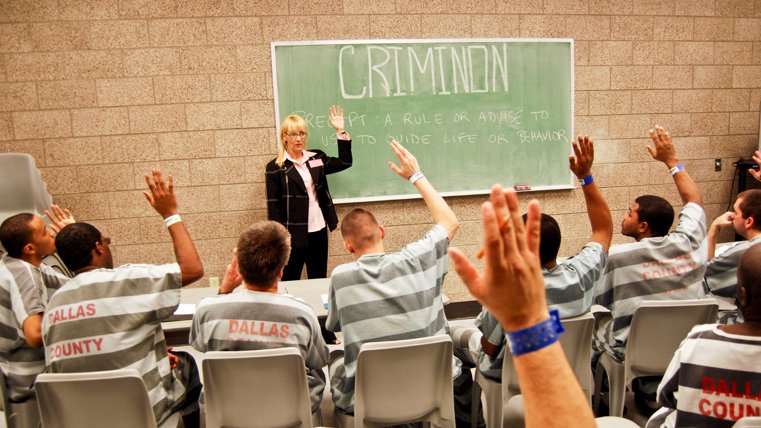
It was during that “extra time” that Daniels completed the Criminon program. Explaining how he found out about the program, Daniels chuckled, “There was a bulletin board in the prison: a poster with a bunch of tear-off tabs. It was the best move I ever made.”
The Criminon volunteers who supervise the correspondence courses often work with the same inmate for years, grading lessons and also giving supportive guidance. Trusted relationships develop. Daniels smiles when mentioning his supervisor, Pam. “It helped to have someone writing to say ‘Good job’ or ‘keep going’ or ‘could you explain this a little better?’” says Daniels.
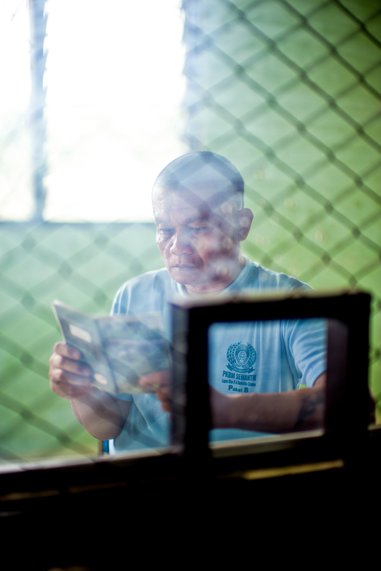
He recalls one turning point came after a particular lesson based on The Way to Happiness, the nonreligious moral code used in the program.
The chapter focuses on a version of the traditional “golden rule”—“Try not to do things to others that you would not like them to do to you.”
“I wrote myself a letter,” said Daniels. “My instructions to me: Treat people the way you want to be treated. If you’re going to do anything that will hurt yourself, don’t do it. If you’re going to do anything that will hurt anybody else, don’t do it.”
Daniels now uses what he learned from Criminon in his job as Outreach Coordinator for Cons Helping Cons, “where we bridge the gap between incarceration and society. Criminon provided the tools for me to reformulate myself. I wanted to be better when I came out than when I went in.”
Edwin Smith is another Criminon graduate who knows the problems of recidivism. After being imprisoned “two or three times” in county jail, he began his first term in Florida state prisons in 2003, first at Lake Butler, then Wakulla. After a brief taste of freedom he served a two-year sentence in Hamilton and then Sumter. Released in 2010, he was soon arrested again and incarcerated in the Taylor Correctional Institution.
It was during that two-year term that another inmate introduced him to Criminon. “Now I’m more grounded because I know things,” said Smith. “I know where the trap doors are. That’s what Criminon did for me: it took the blinders off of everything.”
When he was released this time, in September 2014—two years, nine months and 21 days after his third incarceration (he knows every day of it)—he knew it would be his last. Like Daniels, Smith is now working to help other released inmates as an Outreach Coordinator with Cons Helping Cons.

